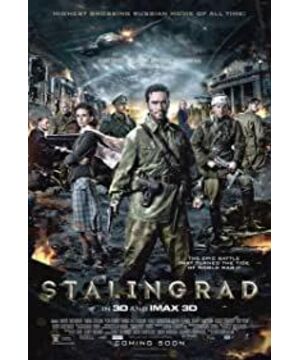In fact, the biggest problem of the film is not the use of war to package the gap brought by love, but the whole film is based on war but has no normal sense of war at all. The Russian soldiers in the film not only shot and killed their own people, but also went out and went shopping with the enemy. Moreover, the film does not explain to the audience the reasons why they stick to the building, including the intention of fighting. The German army has a lot of people to take down the building and it is long-winded and unhappy like an old woman. In the plot, the Russian army obviously has a liaison device, but it is basically a decoration. Except for the final self-sacrifice, it calls for artillery, but why don't they blow up late and not early, the German base is obviously opposite them! Therefore, the film almost empties World War II and all the normal logic that war should have, just to let us pay attention to "five dads."
And there is a bizarre setting at the beginning of the movie. The Russians told others why they had five fathers in the earthquake in Japan! ! ! The interlude is for ambush, but the suspense set by this film for us is why there are five fathers? It is really full of dissonance from the beginning. The film tells that five Russian soldiers broke through the siege and successfully occupied a dilapidated building in the German area. At the same time, they accidentally met a Russian girl in the building. In this short period of time, the five male soldiers in the film developed a strong relationship with the girl, including love, friendship, and family relationships beyond blood relations. The film uses many small details to come Rendering the small touch of mutual support between people during the war. Although the background of the film is set in World War II, the director is very objective to tell this historical story. He did not hate the German army as the enemy, but used a lot of brush and ink to describe the love of the German officer Kahn. He resolutely crossed the line. The borders of the nation fall in love with a foreign woman, and everything he does for love takes great courage. This is a rare humanized depiction of the Nazi German army in film history.
The proportion of love in the film is far greater than that of war. It can be said that the director gave up looking at war from the perspective of a soldier, but interprets the cruelty of war from the perspective of men and women. Although the identities of the two heroines in the movie do not overlap, they are all separated from the battlefield. Even if they are surrounded by guns and artillery shells, they can still take care of their own lives, with a clean and unsullied purity. The male soldiers are an indispensable element of this battlefield, but unfortunately they are in this vortex but can't struggle out. The film uses narration to tell us the tragic family life of the male soldiers. There is a stark contrast to the loneliness of women. It’s a pity that due to the limitation of space, the film did not show the characters of several soldiers in more depth. It can only be a little bit to stop, but fortunately, it can at least leave the audience with space and room to recall.
The film's setting and color palette are very depressing cool colors, the gray sky makes people lose hope of survival, and the only warm color is the fire. It's just that the flames in the film not only burned the living Russian soldiers and Jewish women, but also destroyed the building that brought warmth. In fact, the house in the film has a great symbolic meaning in the film. It is not only the base for the soldiers of the two countries to fight against each other, but also their home in the ruins. Even if they are attacked by artillery fire all the time, they may be silent. The dead will die in the dark night, but as long as you stay in that building, you will have the warmth of home. When the building was destroyed by merciless artillery bombing and collapsed, the bodies of several soldiers were buried in the rubble of the house, which was a tender gesture of despair.
It can be said that there is no heroic complex in the past in "Stalingrad", nor does it raise the theme to national honor and disgrace. The reason for the soldiers to fight for their lives in the film is a woman and a dilapidated building, and emotions are also formed in the film. An important ingredient in adjusting the war. After diluting the coldness and rigidity, the film brings us rare warmth in the world of war, and in the face of warm love, I believe that war is no longer so hideous and terrible! To be honest, if it weren't for the background of World War II, I really don't have the mood to pull so much out of it!
View more about Stalingrad reviews











